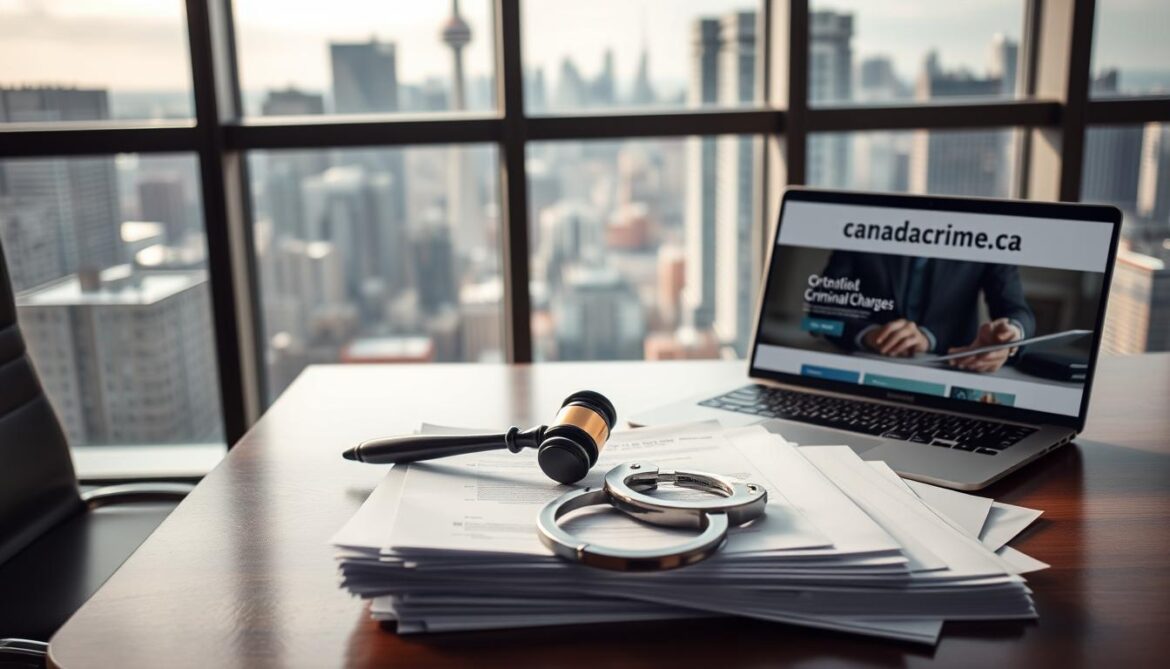Did you know that the Ontario Court of Justice handles about 95% of criminal cases under the Criminal Code of Canada? This shows how key it is to grasp the criminal justice system in Ontario, if you’re facing criminal charges.
Knowing the system can greatly impact your case. The Ontario Court of Justice is the main court for these cases. Being informed about the process can help you move through it better.
Understanding the crime code and the procedures is vital. It helps you make smart choices about your case. Knowing your rights and options is essential.
Understanding the Criminal Justice System in Ontario
Knowing how Ontario’s criminal justice system works is key for those with criminal charges. It’s designed to deal with many cases, making sure justice is fair and quick.
Structure of the Ontario Court System
The Ontario Court of Justice handles most criminal matters. The Superior Court of Justice deals with more serious or complex cases. This way, cases are matched to their level of seriousness and complexity.
| Court | Jurisdiction | Types of Cases |
|---|---|---|
| Ontario Court of Justice | Provincial | Most criminal matters, minor offences |
| Superior Court of Justice | Provincial, higher-level criminal cases | Complex or serious criminal cases, indictable offences |
Key Participants in Criminal Proceedings
Many important people are involved in criminal proceedings in Ontario. These include judges, prosecutors, defense lawyers, and police. For more details, check out Legal Aid Ontario’s FAQ on criminal charges.
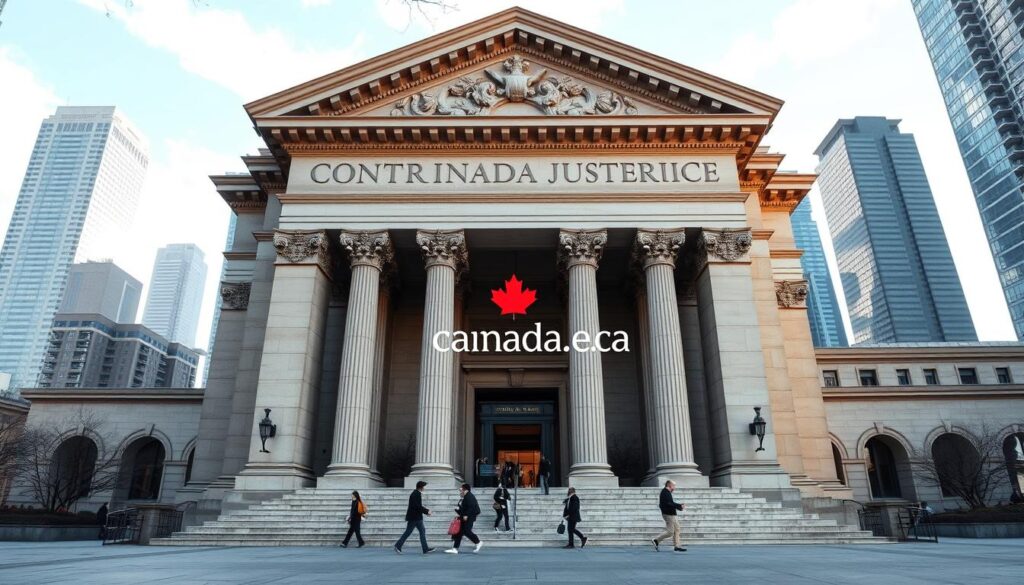
Each person’s role is vital for a fair legal process. Knowing these roles can help those facing criminal charges understand the system better.
Types of Criminal Charges in Ontario
The Ontario legal system has different types of criminal charges. Each type shows how serious the crime is and how it will be handled. Knowing about these categories helps you understand the criminal justice system better.

Summary Conviction Offences
Summary conviction offences are less serious crimes. They are tried in provincial court without a jury. The maximum penalty is usually a fine or a short jail sentence of less than two years.
Examples include minor theft, public intoxication, and some traffic offences. The process for these offences is faster and less formal than for more serious crimes.
Indictable Offences
Indictable offences are more serious and have harsher penalties. Crimes like murder, robbery, and sexual assault fall into this category. These offences often need a preliminary hearing to see if there’s enough evidence for trial.
The accused can choose between a judge alone or a judge and jury for the trial. Penalties for these offences can range from a few years in prison to life imprisonment.
Hybrid Offences
Hybrid offences, or dual-proceeding offences, let the Crown choose how to proceed. They can decide based on the offence’s severity and the offender’s criminal history. This flexibility allows for a more tailored approach to prosecution.
Knowing the type of criminal charge you face is key to preparing your defence. Each category has its own procedures and consequences. It’s important to get legal advice to get the best outcome.
The Criminal Code of Canada: Ontario’s Legal Framework
It’s key to know the Criminal Code of Canada to deal with criminal charges in Ontario. This Code is the base of Canada’s criminal law. It lists different crimes and how to handle them in court.
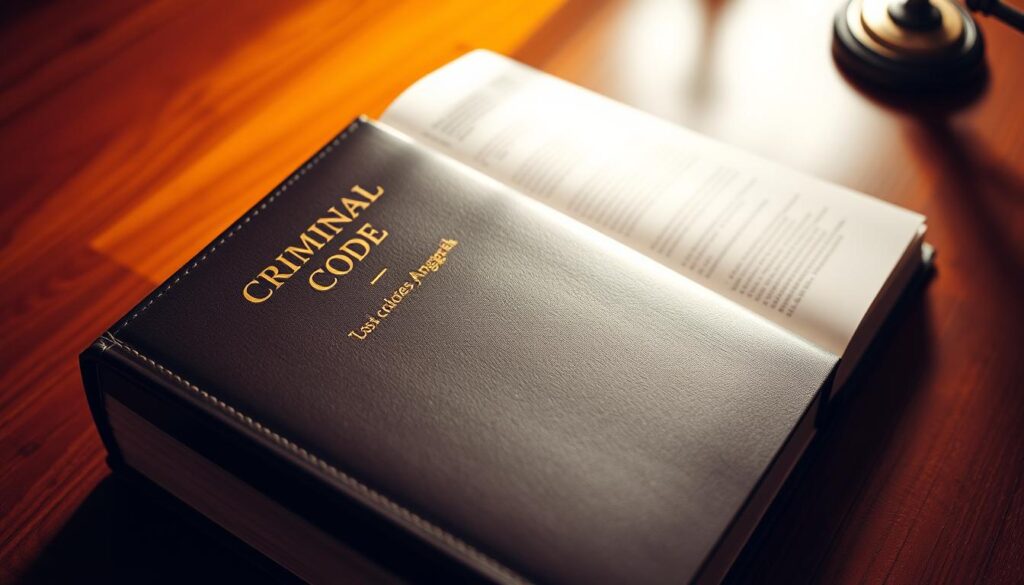
History and Purpose
The Criminal Code started in 1892. Its main goal was to bring together Canada’s criminal laws. Over time, it has changed to keep up with society and justice system updates. It outlines crimes, how to find someone guilty, and what penalties they might face.
Application in Ontario
In Ontario, the Criminal Code is used in all criminal cases. It’s vital for grasping ontario criminal law and court rules. The Code works with other laws to make sure justice is fair and the same everywhere. For details on hate crimes, check out Understanding Hate Crime in Canada.
| Aspect | Description |
|---|---|
| History | Enacted in 1892, with subsequent amendments |
| Purpose | To define criminal offences and procedures |
| Application | Used in all criminal proceedings across Canada, including Ontario |
Recent Amendments and Their Impact
New changes to the Criminal Code tackle issues like cybercrime and violence in relationships. These updates show how crime and society change. It’s important for lawyers and the public to know about these changes in criminal charges ontario.
“The Criminal Code is a living document that must evolve to address the changing nature of crime and the needs of society.” – Justice Minister
Knowing about the Criminal Code helps people understand the criminal justice system in Ontario better.
The Process of Criminal Charges in Ontario
If you’re facing criminal charges in Ontario, understanding the process is key. It starts with an arrest and charging. Then, there are bail hearings and court appearances before the trial.
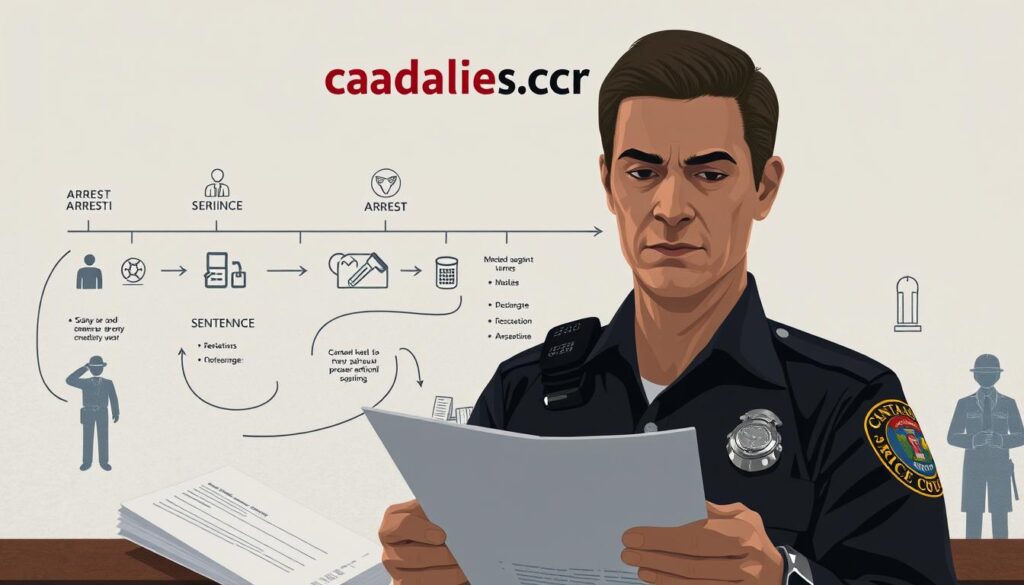
Arrest and Initial Charging Procedures
When arrested, the police must tell you your rights and the charges. The first step is the police laying charges. These charges then go through the court system. It’s important to know you can get legal help during this time.
- The police need good reasons to arrest you.
- You have the right to stay silent and get a lawyer.
- The charges will be in a document from the police.
Bail Hearings and Release Conditions
After being charged, you’ll have a bail hearing. This decides if you can stay out of jail until your trial. The court looks at your past, the charges, and if you’ll show up to court.
Bail conditions might be set if you’re released. These could include reporting to a supervisor, living at a certain address, or giving up your passport. Breaking these rules can mean your bail is taken away.
Court Appearances and Trial Process
As the trial gets closer, you’ll need to go to court several times. These visits are important. They help the court manage the case and make sure both sides are ready for trial.
- The first court visit is for basic things like setting dates.
- Pre-trial hearings might happen to sort out evidence issues.
- The trial will have evidence and witness testimony.
Knowing the crime detail and the process can help you prepare. If you’re worried about someone else’s charges, you might wonder how can you find out if someone got a DUI. You can usually find this info in public court records. But, getting to these records might need some steps and rules.
Your Rights When Facing Criminal Charges in Ontario
When you face criminal charges in Ontario, knowing your rights is key. The Canadian Charter of Rights and Freedoms protects you. It ensures you get a fair treatment in court.
Charter Rights for the Accused
The Canadian Charter of Rights and Freedoms gives you important rights. You have the right to know the charges against you. You also have the right to a fair trial and protection against unfair searches.
Key Charter Rights:
- Right to be informed of the charges
- Right to a fair and public trial
- Protection against unreasonable search and seizure
- Right to counsel
Right to Legal Representation
Having a lawyer is a fundamental right in Ontario. A lawyer can guide you through the legal process. They can also help gather evidence and represent you in court.
| Benefits of Legal Representation | Description |
|---|---|
| Expert Guidance | Understanding the legal process and your options |
| Evidence Collection | Gathering evidence to support your case |
| Court Representation | Effective representation in court proceedings |
Protection Against Self-Incrimination
You have the right to remain silent. This right is protected by the Canadian Charter of Rights and Freedoms. You don’t have to answer questions that could make you look guilty.
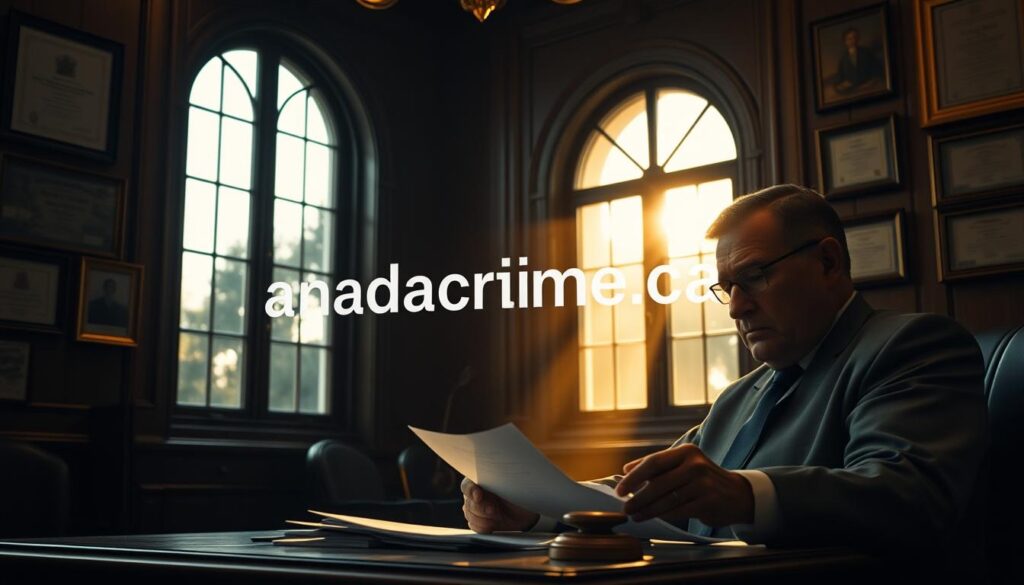
Understanding your rights in Ontario’s criminal justice system is important. Knowing your Charter rights, getting legal help, and avoiding self-incrimination are all key. Being informed is your best defense.
Potential Consequences of Criminal Convictions
Criminal convictions in Ontario can change many parts of your life. It’s important to know these effects to make smart choices during legal proceedings.
Sentencing Guidelines in Ontario Courts
Ontario courts use specific rules to decide sentences. They look at the crime’s severity, the person’s past crimes, and other factors. The Criminal Code of Canada helps keep sentences the same everywhere.
Imprisonment, Probation, and Fines
Penalties for crimes can be jail time, probation, or fines. Jail means you stay in a facility. Probation lets you stay home but with rules. Fines are money you must pay. The penalty depends on the crime and the person’s situation.
| Penalty Type | Description | Typical Use |
|---|---|---|
| Imprisonment | Serving a sentence in a correctional facility | Serious or indictable offences |
| Probation | Supervised release into the community | Less serious offences or first-time offenders |
| Fines | Monetary penalties | Summary conviction offences or regulatory infractions |
Long-term Impacts on Employment and Travel
A crime can affect your job and travel plans. Employers might check your background. Some countries won’t let you in if you’ve been convicted. Knowing these effects is key if you’re facing charges.
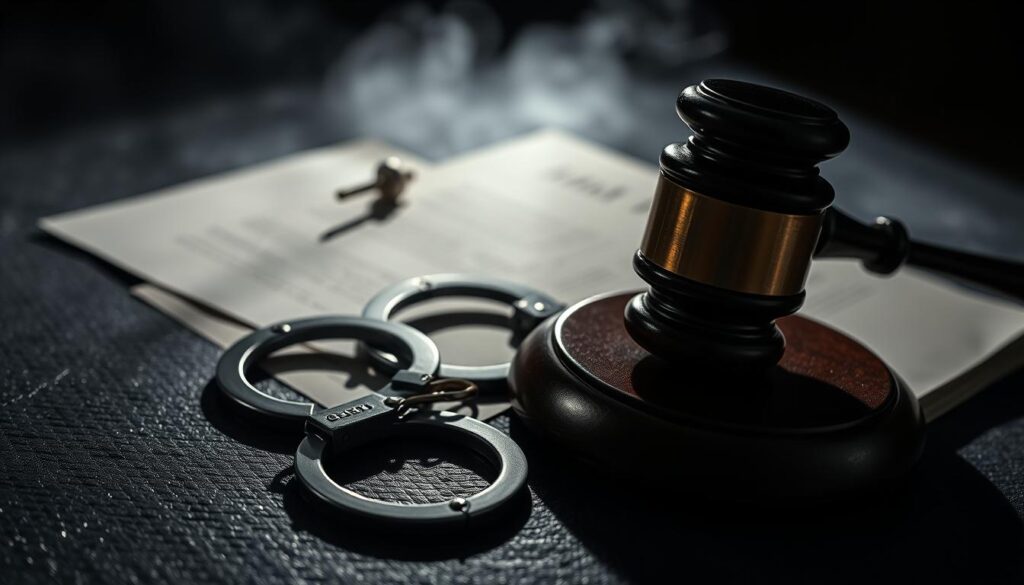
Understanding the effects of criminal convictions helps you deal with the legal system. It’s wise to talk to a lawyer to understand your options and lessen any penalties.
Alternatives to Traditional Prosecution
Ontario’s justice system has more than just traditional prosecution. It includes diversion programs, specialized courts, and restorative justice. These options aim to fix the reasons behind criminal acts. They offer a deeper and more healing way to deal with justice.
Diversion Programs in Ontario
Diversion programs in Ontario are a different path from traditional prosecution. They send people to community-based programs instead of the justice system. These programs help with rehabilitation and making things right, through counseling and community service.
By joining these programs, you can avoid a criminal record. This can also lower the chance of committing a crime again.
Mental Health Court and Drug Treatment Court
Ontario has courts like Mental Health Court and Drug Treatment Court. They help those with mental health issues or addiction. These courts mix treatment with court supervision to tackle the root of criminal behavior.
By taking part in these courts, you get the help you need. This can help you overcome your challenges.
Restorative Justice Approaches
Restorative justice focuses on fixing the harm caused by crimes. It brings together victims, offenders, and the community. They work together to find ways to make things right.
This method lets you take responsibility for your actions. It’s a way to make amends.
As stated by the
“The goal of restorative justice is to repair the harm caused by crime, not just punish the offender.”

Exploring alternatives to traditional prosecution can lead to a better justice path. Ontario’s system offers many options. Whether it’s through diversion programs, specialized courts, or restorative justice, there are ways to address criminal behavior.
How to Access Information About Criminal Charges Ontario
Getting details on criminal charges in Ontario means looking at public court records and knowing about privacy laws. It’s key to have the right info when dealing with criminal charges.
The Ontario court system makes court records public. But, it can be tricky to get to them. Public court records are vital for those wanting to know about legal actions against someone.
Navigating Public Court Records
Understanding the Ontario court system and its records is necessary. You can look up records online or visit court offices in person.
To find what you need, use the Canadian Judicial System online or visit the courthouse. Make sure you have the case number or the accused’s name.
| Record Type | Access Method | Restrictions |
|---|---|---|
| Court Judgments | Online Database | None |
| Case Files | In-person or Online | Privacy Laws Apply |
How Can You Find Out if Someone Got a DUI
To see if someone was charged with a DUI in Ontario, check court records or online tools. Use the Ontario Court Forms database or contact the court directly.
“The right to access information is fundamental in a democratic society, but it must be balanced with the need to protect individual privacy.” – Justice Minister
Privacy Laws and Information Access
Canada’s privacy laws, like Ontario’s Freedom of Information and Protection of Privacy Act, limit what info you can get. These laws protect personal and sensitive data.
When looking for criminal charge info, knowing these laws is important. Only access what you legally can to avoid trouble.

Preventing Criminal Activity and Community Resources
You can help make Ontario safer by using community resources to prevent crime. It’s a team effort involving community members, law enforcement, and local groups.
Community programs are key. They offer support and services to tackle the reasons behind crime.
Community-Based Crime Prevention Programs
In Ontario, community programs are vital. They provide mentorship, counseling, job training, and education. These help people, mainly youth, make good choices and stay away from crime.
Examples of successful programs include:
- Mentorship initiatives that pair at-risk youth with positive role models
- Community centers with recreational activities and educational support
- Job training programs for employment skills
Education and Awareness Initiatives
Education and awareness are key to preventing crime. Public education about crime causes and effects can lower crime rates. This includes workshops, seminars, and campaigns.
| Initiative | Description | Target Audience |
|---|---|---|
| Crime Prevention Workshops | Educational sessions on crime prevention strategies | General Public |
| Youth Awareness Programs | Programs focusing on the risks and consequences of criminal involvement | Youth (12-25 years) |
| Community Safety Seminars | Seminars on community safety and security | Community Members |
Reporting Procedures and Crime Stoppers
Reporting suspicious activities is vital for crime prevention. Crime Stoppers lets you report crimes anonymously. It’s a safe way to help keep your community safe.
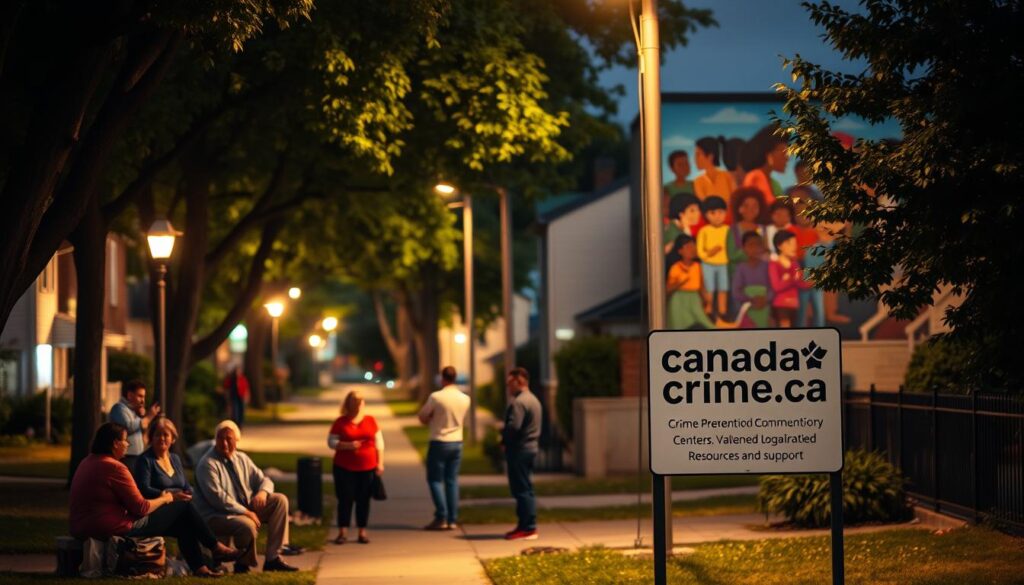
By using community resources and reporting suspicious activities, you can help prevent crime in Ontario.
Conclusion: Moving Forward After Criminal Charges
Understanding criminal charges in Ontario is key to navigating the justice system. If you’re facing charges, knowing your rights and possible outcomes is important. It helps you make better choices.
There are many resources to help prevent crime and support victims. You can learn about crime detail and the Ontario justice system. This knowledge helps prevent future crimes.
It’s vital to focus on preventing crime and supporting community resources. You can report suspicious activity through Crime Stoppers. Also, you can find information on criminal charges in Ontario through public records. By being active in crime prevention, you help make your community safer.
If crime has affected you, there are resources to help. You can look into alternatives to traditional prosecution, like restorative justice. Legal professionals can also guide you through the complexities of criminal charges Ontario.

